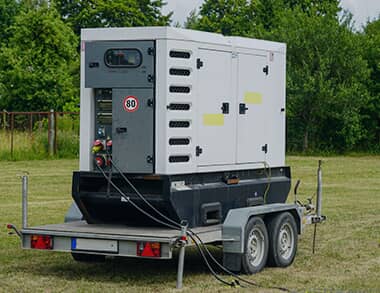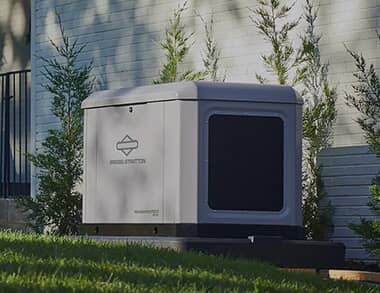Preventative Maintenance on Your Emergency Generator

When the power goes down is not the time to discover that your diesel emergency generator is in need of maintenance. The importance of implementing a regular inspection and maintenance schedule cannot be overstated. Emergency situations don't keep to a set schedule, but you can, and should. Doing so will ensure that when your usual power system fails, your backup system is ready to rise to the occasion so that you can keep the lights on and the machinery functioning.
Well-maintained emergency generators can last from between 10,000 to 30,000 hours. For many generators, these hours are spread out over a period of 20 to 30 years. This reduces your long-term maintenance expenses, helps ensure reliable operation when you need it, and reduces the need to purchase frequent generator replacements.
Emergency generators have a significant number of components that must operate at an efficient level to ensure the safe operation of the unit as a whole. The following are maintenance essentials:
Diesel Fuel System - Once a week, you should conduct a visual inspection and test the day tank float switch and fuel control solenoid. You should also inspect and drain the fuel filter water trap, record water within the fuel tank, check hoses and connections, and wiring within the fuel system. Once per year, you should change the fuel filter, clean the vents, test piping/connections, and test fuel quality.
Coolant System - The coolant and antifreeze levels should be checked weekly and on a semi-annual basis. It is also important to check the radiator air flow, water pumps, hoses, water heater jacket, and louver motors once a week. Once a year, you should clean the exterior of the radiator, conduct a visual inspection of the water pump, and clean ductwork louvers. Every month you should inspect the fans and alternator belt.
Air System - The air filters, air intake, and exhaust systems should be checked once per week and cleaned and repaired as necessary. When air filters get dirty, they should be promptly replaced.
Lubrication System - The lubrication system is susceptible to changing temperatures and should be inspected when weather changes occur. The drive shaft, fans, and other moving components should be inspected once per week to ensure sufficient lubrication.
Electrical System - An emergency generator's electrical systems should be inspected weekly and tested annually for deficiencies. You will want to ensure batteries and the charger, alternator, and transfer switches are in working condition at all times and should not use the generator until any deficiencies are corrected.
Finally, always keep the area around the generator clean and free of debris. This helps prevent damage and can minimize the presence of pests and rodents that can damage the unit.
We encourage you to contact Gen-Tech at (800) 625-8324 for more information about preventative maintenance for your generator. Our team of experienced technicians can help you develop a maintenance plan that will ensure your emergency generator will deliver the performance you need throughout any situation that may arise.
The Value of Preventative Maintenance
Well-maintained emergency generators can last from between 10,000 to 30,000 hours. For many generators, these hours are spread out over a period of 20 to 30 years. This reduces your long-term maintenance expenses, helps ensure reliable operation when you need it, and reduces the need to purchase frequent generator replacements.
Preventative Maintenance Essentials
Emergency generators have a significant number of components that must operate at an efficient level to ensure the safe operation of the unit as a whole. The following are maintenance essentials:
Diesel Fuel System - Once a week, you should conduct a visual inspection and test the day tank float switch and fuel control solenoid. You should also inspect and drain the fuel filter water trap, record water within the fuel tank, check hoses and connections, and wiring within the fuel system. Once per year, you should change the fuel filter, clean the vents, test piping/connections, and test fuel quality.
Coolant System - The coolant and antifreeze levels should be checked weekly and on a semi-annual basis. It is also important to check the radiator air flow, water pumps, hoses, water heater jacket, and louver motors once a week. Once a year, you should clean the exterior of the radiator, conduct a visual inspection of the water pump, and clean ductwork louvers. Every month you should inspect the fans and alternator belt.
Air System - The air filters, air intake, and exhaust systems should be checked once per week and cleaned and repaired as necessary. When air filters get dirty, they should be promptly replaced.
Lubrication System - The lubrication system is susceptible to changing temperatures and should be inspected when weather changes occur. The drive shaft, fans, and other moving components should be inspected once per week to ensure sufficient lubrication.
Electrical System - An emergency generator's electrical systems should be inspected weekly and tested annually for deficiencies. You will want to ensure batteries and the charger, alternator, and transfer switches are in working condition at all times and should not use the generator until any deficiencies are corrected.
Finally, always keep the area around the generator clean and free of debris. This helps prevent damage and can minimize the presence of pests and rodents that can damage the unit.
We encourage you to contact Gen-Tech at (800) 625-8324 for more information about preventative maintenance for your generator. Our team of experienced technicians can help you develop a maintenance plan that will ensure your emergency generator will deliver the performance you need throughout any situation that may arise.
Topics:
From Insights to Power: Let’s Talk Solutions
Whether you need emergency power, maintenance, or expert guidance on your generator system, Gen-Tech has you covered. Our experienced team provides industry-leading service to keep your power running when it matters most. Call (800) 625-8324 to discuss your power generation needs today!
Contact Us













